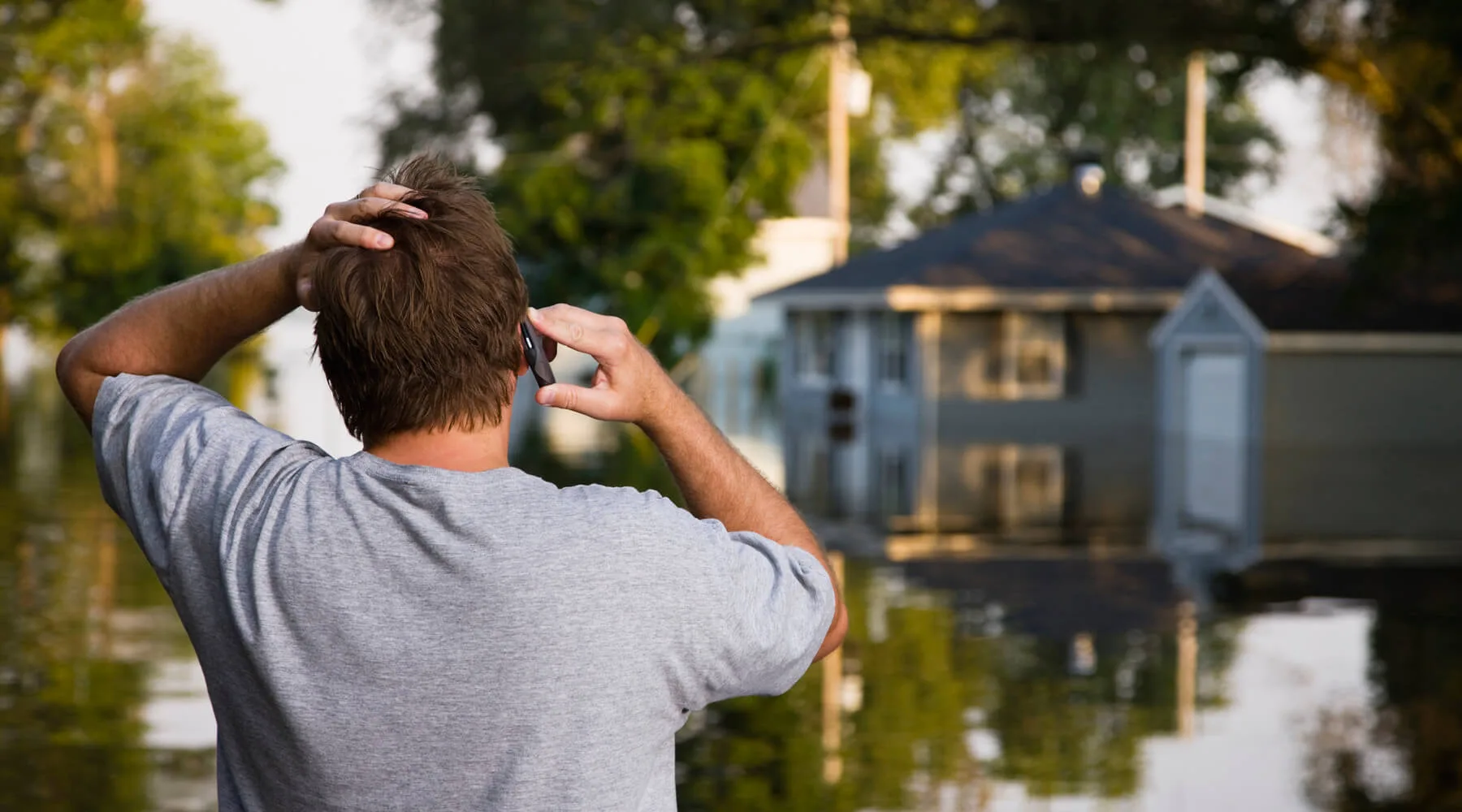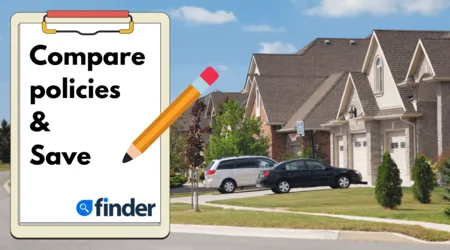Are you new to home insurance?
Never looked into home insurance before? No worries! We've got a guide for first time homeowners to help you understand home insurance and choose the right policy for you.
Scan to download the Finder app on iOS or Android
We’re reader-supported and may be paid when you visit links to partner sites. We don’t compare all products in the market, but we’re working on it!
Did you know?
Switching is easy. In a Finder survey of almost 13,000 Australians, over 1,100 had switched their home and contents insurance in the last 6 months.
Home insurance is an agreement between you and your home insurer. You pay a fee and in return, the insurer financially protects you from unexpected things that can happen around the home.
When applying, you'll have to answer a bunch of questions about your home and living situation. This is so that the insurer can assess your risk and give you a quote based on your needs.
So what happens then?
 Something bad happens, like a tree falling on your roof or a storm
Something bad happens, like a tree falling on your roof or a storm
 You contact your home insurer and make a claim
You contact your home insurer and make a claim
 Your claim is approved or denied (depending on the situation)
Your claim is approved or denied (depending on the situation)
Comparing home insurance online is quick and easy but there are some key terms you'll need to understand before getting started:
Premium. A premium is the price the insurance company will charge you for cover. Most companies will let you choose if you want to pay on a fortnightly, monthly or annual basis.
Excess. This is the amount of money you have to pay before your insurance company will pay out any claim. So if you have a $500 excess and a storm blows a hole in your roof which costs $3,000 to repair, the insurer will pay out $2,500.
Product disclosure statement. This is the legal document that outlines the ins and outs of your policy. It's also known as a PDS.
Insured events. Most insurers have a list of common events that you'll be covered for with home insurance. This includes things like fire, malicious damage, water damage and theft.
Nominated sum insured. This is the amount you insure your house or contents for. It's super important that this figure is accurate. If the sum insured is too low, it could leave you out of pocket if you ever have to repair or rebuild.
Sum insured safeguard. This is an optional benefit offered by some insurance companies which kicks in if your home needs to be repaired or rebuilt, but your sum insured isn't enough to cover it.
Are you new to home insurance?
Never looked into home insurance before? No worries! We've got a guide for first time homeowners to help you understand home insurance and choose the right policy for you.
If you rent out your property, you can see our guide to landlord insurance.
If you own a commercial building, you can see our guide to strata insurance.
Did you know?
In insurance-speak, home insurance refers to the actual structure of your home, as well as more permanent features. It's sometimes referred to as buildings insurance. If you want the items inside your home covered, you'll have to get home and contents insurance.
There's an easy way to figure out which type of home insurance might be best for you:
| Who it suits | Who it doesn't suit | |
|---|---|---|
| Home and contents | ✅ People who own the home they live in ✅ Anyone who wouldn't be able to afford major building repairs to their home ✅ Anyone who wouldn't be able to replace their belongings easily or affordably ✅ Anyone who lives in an area prone to natural disasters | ❌ Renters ❌ Apartment owners who already have strata insurance to cover their building ❌ People who don't have many belongings, or not very expensive belongings |
| Home / buildings | ✅ People who own their home but don't have many belongings or very expensive belongings ✅ Anyone who wouldn't be able to afford major building repairs to their home ✅ Anyone who lives in an area prone to natural disasters | ❌ Renters ❌ Apartment owners who already have strata insurance to cover their building |
| Contents | ✅ Renters ✅ Apartment owners who already have strata insurance to cover their building ✅ Anyone who wouldn't be able to replace their belongings easily or affordably | ❌ People who own the home they live in ❌ People who don't have many belongings or many expensive belongings |
If you're trying to find the best home insurance policy, check out our guide. We've researched some Top Picks and can help you figure out how to find the best policy for you.
Compare the benefits of different policy types.
Home and contents insurance policies vary between different insurers, so they have slightly different benefits. However, here is a generalisation of what's usually covered and not covered with home insurance.
| Is this covered? | Home & contents insurance | Building insurance | Contents insurance |
|---|---|---|---|
| Storm and rainwater damage | |||
| Escape of liquid, such as a burst pipe | |||
| Fire damage | |||
| Theft and attempted theft | |||
| Malicious damage and vandalism | |||
| Breakage of glass, ceramics and sanitary fixtures | |||
| Explosions | |||
| Impact damage, such as a fallen tree | |||
| Lightning strikes | |||
| Temporary accommodation | |||
| Flood | |||
| Earthquake or tsunami | |||
| Accidental damage | |||
| Portable contents | |||
| Motor burnout | |||
| Deliberate or negligent damage | |||
| General wear and tear | |||
| Asbestos | |||
| Mould, termites or vermin | |||
| Damage from renovations | |||
| If your home is unoccupied |
In most cases, yes.
Of course, we can't force you to do anything, but buying a house is usually one of the biggest financial decisions of your life so it makes sense to protect it. Also, if you've planned to take out a mortgage, most lenders won't approve your application without adequate home insurance.
If you're still unsure, ask yourself the following questions. If you answer YES to any of them, you should really consider home insurance.
Would I be stuck finding somewhere else to live if my home was suddenly uninhabitable?
Would I struggle to pay for major home repairs?
Do I keep anything valuable in my home that would be hard or expensive to replace?
Do I live in an area which is prone to natural disasters?
Do I live in a high-crime area, where burglary or vandalism might occur?

The cost of home insurance varies massively depending on the value of your home and its location, among other factors.
However, Finder research found that the average cost of a home and contents insurance policy is $136 a month, based on a suburban home worth $500,000 and contents of $100,000.
The Emergency Services Levy Insurance Monitor, a government initiative which tracked the cost of home insurance across NSW, returned a slightly lower average premium of $102 a month.
Compare policies and get a quote


Home insurance is a big purchase, so we understand you want to get it right. Here's how to make sure you're getting a good deal:
 Know the specs of your home
Know the specs of your homeYou'll need to know the details of your home, like when it was built and what materials it's made from.
 Value your belongings
Value your belongings This can be tough. We recommend going room to room and slowly building up a valuation or bring in a professional to do it.
 Compare online and request quotes
Compare online and request quotes You can use our comparison table to compare benefits from Finder partners side by side. The only way to find out exactly how much home insurance will cost is by requesting a personalised quote.
We recommend requesting a few and comparing.
 Check the PDS
Check the PDSBefore you buy home insurance, always check the product disclosure statement. It'll tell you everything that is, and isn't, covered by your policy.
 Check for offers
Check for offers Some insurers have sign-up deals for new customers which could save you as much as 30% – always check before purchasing.
For a lot of people, yes. Finder research shows that the average cost of home insurance is $1,344 a year, based on a suburban home worth $500,000 and contents of $100,000.
That means, for $1,344 you'd be receiving $600,000 worth of protection. Imagine a strong storm or a fallen tree destroys your roof. The average cost to install a new roof for a moderate-sized home is around $7,500.
Plus, even relatively minor damage can easily cost more than $1,344. If a waste pipe burst in your home, not only would you be hit with plumbing costs, you'd also have to look into replacing furniture or belongings.
Anyone looking for home insurance has heaps of options to choose from. We've listed just some of Australia's major providers below.
If the brand you're looking for isn't here, check out our directory.
Did you know that home insurance can also cover temporary housing for your pets if your home became uninhabitable? It can also cover your holiday home if you're not always there. Here are some other things that home insurance can cover you for.
Back to topHome insurance can be a major expense for lots of Aussies but there are ways to make your premiums more affordable.
Finder cost research shows you can halve the cost of your insurance premiums, just by comparing online. Why wouldn't you?
Lots of insurers offer sign-up deals which can reduce your premium by up to 30%. Always check for offers before finalising.
Opting for a higher excess will reduce the cost of your premium. Just be sure the excess will be affordable in the event of a claim.
There's nothing wrong with switching insurers on a regular basis. It's the best way to make sure you're getting a good deal.
There are heaps of home insurance deals which can save you up to 30% on your premium. That means if you have an annual premium of $1,200, you could save $360.
30% online discount on new home & contents insurance
Buy online and save up to 30% on a home & contents policy with Australian Seniors.
Earn up to 20,000 Qantas Points with Qantas home insurance
Save up to 25% when you buy online
Get up to 25% off when you sign up for a new home and contents policy
Get up to 20% off your first years’ premium with QBE Building and Contents Insurance
Save up to 20% on a new combined home and contents insurance policy
You'll never be charged for clicking through to one of our partners. We get paid out of their pocket, not yours.
Our experts have done heaps of research so you can compare policies side by side.
Our cost research shows you can easily cut your home insurance premium in half – just by comparing online.
Start comparing home insurance
Underinsurance protection gives you peace of mind that if your home is accidentally underinsured, your policy will still make up the difference.
You can insure your property and its contents, but you'll have to get landlord insurance rather than a standard home insurance policy.
Yes. You can get owner builder insurance. It'll cover the building while it's under construction, as well as covering yourself from liability issues.
In most cases, home insurance isn't tax deductible. However, you may be able to claim a deduction if your home is used for work.
Your insurance will typically cover your foundation if it is damaged in an event you are insured against like an earthquake, storm or flood. However, most policies will not cover you for foundation damage related to tree roots or naturally shifting soil (unless the shifting soil can be directly tied to an earthquake, flood or other insured event).
If you want peace of mind and protection for your home and the belongings in it, you need home and contents insurance. Your home is usually the most expensive asset you own, so protecting it is a smart option. If anything goes wrong, from a bushfire to a damaged laptop, it can ensure that you're not having to fork out a lot of cash to get things back to normal.
We did some research and found that the average cost of home insurance in Australia is $136.73. However, this is going to vary based on your own living situation.
The cost of home insurance can depend on a number of different factors including:
Contents insurance can cover a broad range of items and belongings including:
You don't need home insurance because your landlord is usually responsible for any damage (that isn't caused by you) to the home. However, this doesn't protect your belongings. For that, you need contents insurance, sometimes called "renters insurance". This can look after all the items you own, including furniture, electrical appliances, kitchen stuff and more. It can also provide you with legal liability cover. That means if you get into a dispute with your landlord and need to pay for legal costs, contents insurance can cover you.
All types of insurance have an excess. This is the bit of the insurance payout that you need to pay if you make a claim. The amount you need to pay differs between insurers but it should be laid out in your certificate of insurance. So what's the point in an excess? Put simply, it lets the insurer move a small part of the financial risk back to you. It's generally not something you can avoid; most insurers make you pay an excess. The best you can do is keep an eye out for how big they are when you're comparing policies.
In a nutshell, new for old means that if your personal belongings are damaged beyond repair or stolen, your contents insurance can pay the cost of new equivalent items to replace them. That doesn't mean you'll get an upgrade; it only covers a new equivalent item. This is a little different from replacement value cover which only covers you for the current value of your possessions when you make a claim. So for example, if you were to break your laptop, you wouldn't be reimbursed for the cost of a new equivalent laptop but rather the current value of your laptop, with depreciation taken into account.
Sum insured cover is when you choose the maximum amount of cover you want for your home. For example, if you think your home will cost $1,500,000 to rebuild from scratch, this is the sum insured you'd select. Total replacement insurance, on the other hand, covers the market value of rebuilding your home. Sum insured is riskier (and usually cheaper) because there's a chance you won't value the home properly. For example, if your sum insured is $1,500,000 but your home ends up costing $1,800,000 to rebuild, you'll have to pay the $300,000 yourself. You can find out more about total replacement cover here.
In most cases, you'll find that the standard definition of a flood is this: "The covering of normally dry land by water that has escaped or been released from the normal confines of any lake, or any river, creek or other natural watercourse, whether or not altered or modified; or any reservoir, canal, or dam." Insurers don't generally cover storm surges, where an increase in the sea level caused by a weather event pushes water onshore.
It really depends, most insurers have inclusions and exclusions for damages caused by people who are invited onto your property.
As an example, most policies usually cover you for accidental damage caused by your guests, however, there are often exclusions for theft caused by your visitors.
Check out our garage sale tips to help you make some extra cash while keeping your place safe.
This depends on the insurer. Some home and contents insurance policies automatically cover it, others do not. So if you want cover for accidental damage, make sure you check the product disclosure statement before you buy a policy.

There’s been over 25,000 power outages across Victoria. Home insurance can reimburse you for the food that’s gone to waste. Find out who here.
Read more…
Since COVID-19, millions of Aussies have switched home and car insurance providers – learn why and you could save up to $2,643.
Read more…
We found 3 policies that will cover you if mice cause fire or water damage.
Read more…Icons made by Vectors Market, Freepik from www.flaticon.com
Nicola Middlemiss is a senior writer at Finder, focusing on all things insurance. She's been a journalist for over five years and has contributed to a wide range of industry publications including Insurance Business, MoneyMag, the Educator, Your Investment Property, Mortgage Professional Australia, and Wealth Professional. She has written over a thousand articles covering the insurance industry and now uses that insight to help Australian consumers understand their own insurance policies, and make smarter decisions. Nicola has a Tier 1 General Insurance (General Advice) certification and a Bachelor's degree from the University of Leeds.
What to know about insurance before renting out your home, and what to look for in Airbnb insurance.
If you’re looking for home insurance for an apartment, here’s the ultimate guide to finding comprehensive and affordable cover.
Wondering if home insurance brokers are worth it? Find out if they're right for you with this straightforward guide.
We talk you through how to get home office insurance.
How home insurance can cover you for food spoilage and save you hundreds on wasted food.
Want hearing aid insurance? Home insurance is the answer.
All home insurance policies have a common list of covered events. These insured events include things like fire, storm and theft.
Curious to know what happens if you commit insurance fraud on a home insurance claim? Here's what we know, and why you probably shouldn't do it.
Knowing the difference between fixtures and fittings can help you decide which home insurance policy is right for you.
Protect your home from the costs of malicious damage with home insurance. Compare policies in just minutes and get peace of mind.
Our goal is to create the best possible product, and your thoughts, ideas and suggestions play a major role in helping us identify opportunities to improve.
finder.com.au is one of Australia's leading comparison websites. We compare from a wide set of banks, insurers and product issuers. We value our editorial independence and follow editorial guidelines.
finder.com.au has access to track details from the product issuers listed on our sites. Although we provide information on the products offered by a wide range of issuers, we don't cover every available product or service.
Please note that the information published on our site should not be construed as personal advice and does not consider your personal needs and circumstances. While our site will provide you with factual information and general advice to help you make better decisions, it isn't a substitute for professional advice. You should consider whether the products or services featured on our site are appropriate for your needs. If you're unsure about anything, seek professional advice before you apply for any product or commit to any plan.
Products marked as 'Promoted' or 'Advertisement' are prominently displayed either as a result of a commercial advertising arrangement or to highlight a particular product, provider or feature. Finder may receive remuneration from the Provider if you click on the related link, purchase or enquire about the product. Finder's decision to show a 'promoted' product is neither a recommendation that the product is appropriate for you nor an indication that the product is the best in its category. We encourage you to use the tools and information we provide to compare your options.
Where our site links to particular products or displays 'Go to site' buttons, we may receive a commission, referral fee or payment when you click on those buttons or apply for a product. You can learn more about how we make money here.
When products are grouped in a table or list, the order in which they are initially sorted may be influenced by a range of factors including price, fees and discounts; commercial partnerships; product features; and brand popularity. We provide tools so you can sort and filter these lists to highlight features that matter to you.
We try to take an open and transparent approach and provide a broad-based comparison service. However, you should be aware that while we are an independently owned service, our comparison service does not include all providers or all products available in the market.
Some product issuers may provide products or offer services through multiple brands, associated companies or different labelling arrangements. This can make it difficult for consumers to compare alternatives or identify the companies behind the products. However, we aim to provide information to enable consumers to understand these issues.
Providing or obtaining an estimated insurance quote through us does not guarantee you can get the insurance. Acceptance by insurance companies is based on things like occupation, health and lifestyle. By providing you with the ability to apply for a credit card or loan, we are not guaranteeing that your application will be approved. Your application for credit products is subject to the Provider's terms and conditions as well as their application and lending criteria.
Please read our website terms of use and privacy policy for more information about our services and our approach to privacy.
I want to insure my Furnitue etc in a container at a self storage facility
What’s the best way to go about this?
Hi Kane,
Home and contents insurance can be customized to have contents in commercial storage covered. If you already have one, you can contact your provider to discuss how you can have it added to your existing policy.
If you are still in search of a cover, you can check out options on our Compare Home and Contents Insurance page.
Regards,
James
i want home insurance ‘without’ contents. does anyone know of an insurer.
Hi Tracey,
Thanks for your comment and I hope you are doing well.
Yes, you can find home insurance only for your home through home building insurance. As it says above, this is a stand-alone cover for only your home. It also covers other fixtures on your property, such as garages, fences, and sheds. It protects you against a bunch of natural events, such as fire, storm damage, and floods.
You will find a table that compares the features and benefits of each home insurance provider in terms of what it does and doesn’t cover. This way it will be easier for you to see which provider fits you best. If you need further help, a quick guide on how to compare home insurance is also stated on the page. As a friendly reminder, carefully review the Product Disclosure Statement of the product before applying. You may also contact the insurance provider should you have any questions about their policy.
I hope this helps and feel free to reach out to us again for further assistance.
Best,
Nikki
I been trying to look for a home insurance for me rental property but it was declined due to the following reasons:
1. it is a rental property and we don’t know when we can have a tenant to occupy the property
2. Its still under renovation/construction but water tight now.
can you please help me find a cover for my property?
Hi Andrew,
Thanks for your message and for visiting Finder.
Sorry to hear that you’ve been declined for home insurance. Perhaps you may want to look at landlord insurance. You can compare and choose insurers as well as information on coverage, benefits, and the difference between home insurance and landlord insurance.
However, many insurers won’t cover you if your property will be unoccupied for over 30 days. It will be considered unoccupied and you may void your home insurance. Each provider imposes its own time limit on the maximum period you can leave your home unoccupied and still expect full coverage under your policy. Some insurers have a maximum unoccupied limit of 60 days, others extend this limit out to 90 days, but some companies require notification if you’ll be away for more than 30 days.
Check the product disclosure statement (PDS) for the limit imposed by your insurer. If you exceed this limit, one of two things will happen:
However, it may be possible to contact your insurer and arrange for home insurance cover to remain in place for the entire time your home is unoccupied. For more information, you may view our review on unoccupied home insurance.
Hope this helps! Feel free to message us anytime should you have further questions.
Cheers,
Nikki
If I purchase a property, do I need any form of insurance prior to settlement? Deposit insurance??
thanks
Hi Peter,
Thanks for reaching out.
That would be the Lenders Mortgage Insurance and it will depend on how much deposit you are able to make.
LMI is an upfront charge you will pay if you borrow over 80% of your property’s purchase price or value when buying a home or investment property.
Because LMI allows many borrowers to purchase a home with as little as a 5% deposit, it’s not just a fee but also a tool. You can learn more about Lenders Mortgage Insurance (LMI). Our guide provides information on how it works, ways to avoid LMI, and answers to commonly asked questions.
Cheers,
Joanne
Need insurance that will cover our home year round, we live in the home 6 months a year and overseas 6 months a year, during which time we will Air BNB which we also need to be covered for. Would prefer complete replacement cover. Getting so many varying quotes and getting a bit lost!
Hi ET,
Thank you for your question.
I’m sorry to hear about the difficulty you’re having. While we can’t provide specific recommendations, I advise that you check your options listed on this page.
Aside from that, you may find ShareCover page helpful. They could cover your home. Please get in touch with them so you can get more details.
All the best,
Zubair